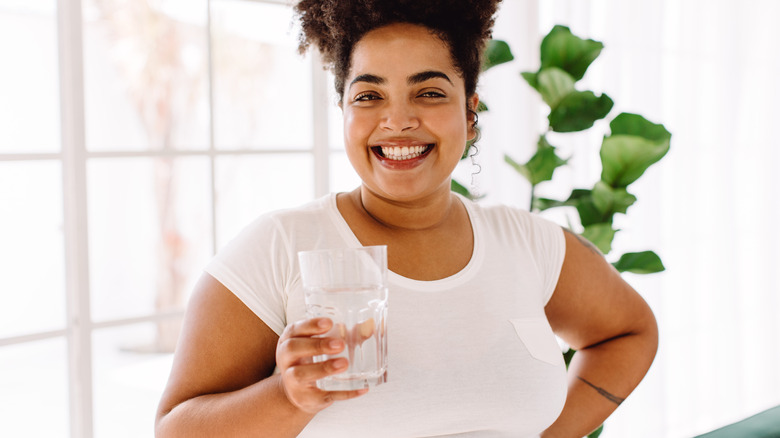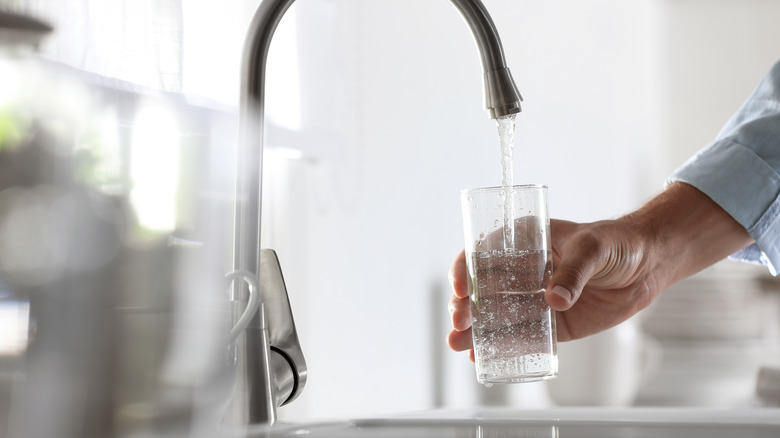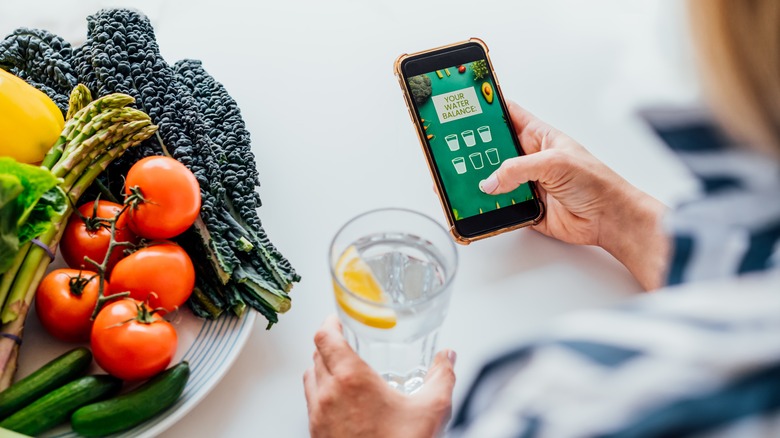How To Determine The Right Amount Of Water For You, According To A Dietitian
Some people talk about drinking enough water as if it's the most important cure for everything, from clear skin to regular bowel movements. And while nothing is an overnight fix, drinking enough water significantly impacts your overall health, as our bodies are made up of 60% water, according to Healthline. It's true that things like energy levels, brain function, kidney health, and even weight loss are affected by how much water we drink each day.
Health Digest spoke exclusively to The Age-Defying Dietitian Kathryn Piper, RDN, LD, who shared with us about just how much water you should be drinking every day. With so many different sources of information, it can be hard to know how many ounces you should really be aiming for. But according to Piper, there are actually lots of things to consider when determining that number. "Various factors impact the amount of water someone should drink," she said. "These include weight, age, activity level, climate, and any health conditions."
The factors that can determine your water intake
Piper told Health Digest that you'll have to take multiple factors into consideration to figure out how much you need to be drinking. "Generally, the more a person weighs, the more water they need to consume to stay hydrated," she told us in an exclusive chat. If you work out or move your body a lot, you'll need to consume more water too, so it's a good idea to make sure you bring that water bottle to the gym. "People who engage in physical activities, such as exercise or manual labor, tend to lose more water through sweat and need to drink more water."
Where you live could have an impact on your water consumption as well. Piper shared, "People who live in hot, humid climates may need to drink more water to stay hydrated than those who live in cooler climates." But you also have to take your own personal health into consideration too, according to Piper. "Certain medical conditions, such as diabetes or kidney disease, may require a person to limit their water intake," she shared. "In contrast, people who have conditions that cause frequent urination or sweating, such as fever, diarrhea, or vomiting, may need to drink more water."
Your age matters, too. "Older adults may be at increased risk of dehydration due to changes in their body's ability to conserve water and thirst sensation," Piper said.
How to set a baseline for how much water to drink
So how much is the right amount? Piper told Health Digest that one way of figuring out a rough number is through some simple math. "A rough estimate of daily water needs can be calculated by dividing your weight in half, and aiming for this many ounces of water per day," she shared. "For example, a 150-pound person would need approximately 75 ounces, or about 9 cups of water per day."
You could also look at the color of your urine to determine if you're drinking enough. Piper explained, "When you are well-hydrated, your urine will be a light yellow color similar to lemonade. If your urine is dark yellow or amber-colored, it may be a sign that you are not drinking enough water and are dehydrated."
It's also useful to pay attention to how often you're urinating. "How often you urinate can also be a way to monitor your hydration level," said Piper. "If you are well-hydrated, you should be urinating regularly throughout the day, typically every 2-4 hours." But if you notice that you're urinating less than this, it could mean that you're not drinking enough water.
Creative ways to increase your water consumption
Not drinking enough? It can feel hard to get more glasses in throughout the day, but Piper shared some ideas with Health Digest. "There are several effective ways to increase your water intake," she explained. "Try carrying a water bottle with you, flavoring your water with fresh fruit, setting a goal for your water intake, or tracking your water intake with an app."
When we don't drink enough water, our bodies might suppress certain functions like urinating in order to preserve fluid levels, according to Everyday Health. You might not feel thirsty, but you should still prioritize getting enough water throughout your day. Other tips for getting enough water include eating fruits and veggies that are hydrating such as melon or cucumber, asking a friend to be your accountability buddy, and making sure to drink one glass of water for every other beverage like coffee or juice (via Mayo Clinic). You could also try drinking water at certain times of the day and tying it to part of your routine, like when you brush your teeth or use the bathroom.




